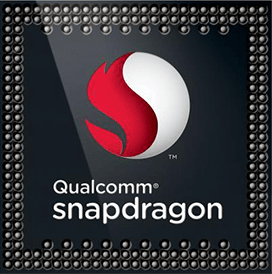
Qualcomm Snapdragon 710 Benchmark, Test and specs
Last updated:
The Qualcomm Snapdragon 710 has 8 CPU cores and can process 8 threads at the same time. The processor was presented in Q2/2018 and is based on the 1. Generation of the Qualcomm Snapdragon series. In the Geekbench 5 benchmark, the Qualcomm Snapdragon 710 achieved a result of 408 points (single-core) or 1,526 points (multi-core).

| Name: | Qualcomm Snapdragon 710 |
|---|---|
| Family: | Qualcomm Snapdragon (102) |
| CPU group: | Qualcomm Snapdragon 710 (2) |
| Architecture: | Kryo 360 |
| Segment: | Mobile |
| Generation: | 1 |
| Predecessor: | -- |
| Successor: | -- |
CPU Cores and Base Frequency
The Qualcomm Snapdragon 710 has 8 cores. The clock frequency of the Qualcomm Snapdragon 710 is 2.20 GHz. An initial performance assessment can be made using the number of CPU cores.
| CPU Cores / Threads: | 8 / 8 |
|---|---|
| Core architecture: | hybrid (big.LITTLE) |
| A-Core: | 2x Kryo 360 Gold |
| B-Core: | 6x Kryo 360 Silver |
| Hyperthreading / SMT: | No |
|---|---|
| Overclocking: | No |
| A-Core Frequency: | 2.20 GHz |
| B-Core Frequency: | 1.70 GHz |
Artificial Intelligence and Machine Learning
Processors with the support of artificial intelligence (AI) and machine learning (ML) can process many calculations, especially audio, image and video processing, much faster than classic processors. Algorithms for ML improve their performance the more data they have collected via software. ML tasks can be processed up to 10,000 times faster than with a classic processor.
| AI hardware: | Qualcomm AI engine |
|---|---|
| AI specifications: | Hexagon 685 @ 3 TOPS |
Internal Graphics
The Qualcomm Snapdragon 710 has an integrated graphics that the system can use to efficiently play back videos. The Qualcomm Snapdragon 710 has the Qualcomm Adreno 616 installed, which has -- streaming multiprocessors (256 shaders).
| GPU name: | Qualcomm Adreno 616 |
|---|---|
| GPU frequency: | 0.75 GHz |
| GPU (Turbo): | 0.75 GHz |
| Compute units: | -- |
| Shader: | 256 |
| Hardware Raytracing: | No |
| Release date: | Q2/2018 |
| Max. displays: | 0 |
|---|---|
| Generation: | 6 |
| Direct X: | 12.1 |
| Technology: | 10 nm |
| Max. GPU Memory: | -- |
| Frame Generation: | No |
Hardware codec support
Processors with integrated graphics can process video codecs faster. Support for modern codecs can significantly increase system efficiency during video playback.
| h265 / HEVC (8 bit): | Decode |
|---|---|
| h265 / HEVC (10 bit): | Decode |
| h264: | Decode |
| VP8: | Decode |
| VP9: | Decode |
| AV1: | No |
|---|---|
| AVC: | Decode |
| VC-1: | Decode |
| JPEG: | Decode |
Memory & PCIeThe Qualcomm Snapdragon 710 supports a maximum of 8 GB memory. Depending on the mainboard, the processor can use a maximum of 2 (Dual Channel) memory channels. This results in a maximum bandwidth of the main memory of 14.9 GB/s. |
|
| Memory type: | Memory bandwidth: |
|---|---|
| LPDDR4X-3733 | 14.9 GB/s |
| Max. Memory: | 8 GB |
| Memory channels: | 2 (Dual Channel) |
| ECC: | No |
| PCIe: | |
| PCIe Bandwidth: | -- |
Thermal ManagementThe Qualcomm Snapdragon 710 has a TDP of . Based on the TDP, the system manufacturer can and must adapt the cooling solution to the processor. |
|
|---|---|
| TDP (PL1 / PBP): | |
| TDP (PL2): | -- |
| TDP up: | -- |
| TDP down: | -- |
| Tjunction max.: | -- |
Technical details
Modern production reduces the waste heat of a processor and increases its efficiency. The Qualcomm Snapdragon 710 is made in 10 nm and has 0.00 MB cache.
| Technology: | 10 nm |
|---|---|
| Chip design: | Chiplet |
| Socket: | -- |
| L2-Cache: | -- |
| L3-Cache: | -- |
| AES-NI: | No |
| Operating systems: | Android |
| Virtualization: | None |
|---|---|
| Instruction set (ISA): | Armv8-A (64 bit) |
| ISA extensions: | -- |
| Release date: | Q2/2018 |
| Release price: | -- |
| Part Number: | SDM710 |
| Documents: | Technical data sheet |
Rate this processor
Benchmark results

The benchmark results for the Qualcomm Snapdragon 710 have been carefully checked by us. We only publish benchmark results that have been created by us or that have been submitted by a visitor and then checked by a team member. All results are based on and fullfill our benchmark guidelines.
Geekbench 5, 64bit (Single-Core)
Geekbench 5 is a cross plattform benchmark that heavily uses the systems memory. A fast memory will push the result a lot. The single-core test only uses one CPU core, the amount of cores or hyperthreading ability doesn't count.

|
AMD A8-5500B
4C 4T @ 3.70 GHz |
||

|
MediaTek Helio P95
8C 8T @ 2.20 GHz |
||

|
AMD Phenom II X2 555
2C 2T @ 3.20 GHz |
||
|
|
Qualcomm Snapdragon 710
8C 8T @ 2.20 GHz |
||

|
Intel Pentium E6500K
2C 2T @ 2.93 GHz |
||

|
Intel Pentium E6500
2C 2T @ 2.93 GHz |
||

|
Intel Core 2 Quad Q9450
4C 4T @ 2.66 GHz |
||
Geekbench 5, 64bit (Multi-Core)
Geekbench 5 is a cross plattform benchmark that heavily uses the systems memory. A fast memory will push the result a lot. The multi-core test involves all CPU cores and taks a big advantage of hyperthreading.

|
Intel Core i3-4130T
2C 4T @ 2.90 GHz |
||

|
Intel Core 2 Quad Q9500
4C 4T @ 2.83 GHz |
||

|
Intel Core 2 Quad Q9550
4C 4T @ 2.83 GHz |
||
|
|
Qualcomm Snapdragon 710
8C 8T @ 2.20 GHz |
||

|
Intel Core i5-750S
4C 4T @ 2.40 GHz |
||
|
|
HiSilicon Kirin 960
8C 8T @ 2.40 GHz |
||

|
Intel Celeron J4105
4C 4T @ 2.40 GHz |
||
Geekbench 6 (Single-Core)
Geekbench 6 is a benchmark for modern computers, notebooks and smartphones. What is new is an optimized utilization of newer CPU architectures, e.g. based on the big.LITTLE concept and combining CPU cores of different sizes. The single-core benchmark only evaluates the performance of the fastest CPU core, the number of CPU cores in a processor is irrelevant here.

|
Intel Pentium Silver J5040
4C 4T @ 3.20 GHz |
||

|
Intel Core i5-3317U
2C 4T @ 2.60 GHz |
||

|
Intel Core i3-530
2C 4T @ 2.93 GHz |
||
|
|
Qualcomm Snapdragon 710
8C 8T @ 2.20 GHz |
||

|
Apple A8X
3C 3T @ 1.50 GHz |
||

|
Intel Core i5-2537M
2C 4T @ 2.30 GHz |
||

|
MediaTek Helio G85
8C 8T @ 2.00 GHz |
||
Geekbench 6 (Multi-Core)
Geekbench 6 is a benchmark for modern computers, notebooks and smartphones. What is new is an optimized utilization of newer CPU architectures, e.g. based on the big.LITTLE concept and combining CPU cores of different sizes. The multi-core benchmark evaluates the performance of all of the processor's CPU cores. Virtual thread improvements such as AMD SMT or Intel's Hyper-Threading have a positive impact on the benchmark result.

|
Intel Core i7-870S
4C 8T @ 2.66 GHz |
||

|
Intel Core i5-8200Y
2C 4T @ 2.80 GHz |
||

|
Intel Core i3-5010U
2C 4T @ 2.10 GHz |
||
|
|
Qualcomm Snapdragon 710
8C 8T @ 2.20 GHz |
||

|
Intel Processor N50
2C 2T @ 3.20 GHz |
||

|
Samsung Exynos 8895
8C 8T @ 2.30 GHz |
||

|
Intel Core m5-6Y57
2C 4T @ 2.20 GHz |
||
iGPU - FP32 Performance (Single-precision GFLOPS)
The theoretical computing performance of the internal graphics unit of the processor with simple accuracy (32 bit) in GFLOPS. GFLOPS indicates how many billion floating point operations the iGPU can perform per second.

|
AMD A8-5500
AMD Radeon HD 7560D @ 0.76 GHz |
||

|
AMD A8-5500B
AMD Radeon HD 7560D @ 0.76 GHz |
||

|
AMD A8-5600K
AMD Radeon HD 7560D @ 0.76 GHz |
||
|
|
Qualcomm Snapdragon 710
Qualcomm Adreno 616 @ 0.75 GHz |
||

|
Intel Core i5-14450HX
Intel UHD Graphics 13th Gen (16 EU) @ 1.50 GHz |
||

|
Intel Atom x7425E
Intel UHD Graphics 24 EUs (Alder Lake) @ 1.00 GHz |
||

|
Intel Processor N200
Intel UHD Graphics 32 EUs (Alder Lake) @ 0.75 GHz |
||
AnTuTu 8 Benchmark
The AnTuTu 8 Benchmark measures the performance of a SoC. AnTuTu benchmarks the CPU, GPU, Memory as well as the UX (User Experience) by simulating browser and app usage. AnTuTu can benchmark any ARM CPU that runs under Android or iOS. Devices may not be directly compareable if the benchmark has been performed under different operating systems.
In the AnTuTu 8 benchmark, the single-core performance of a processor is only slightly weighted. The evaluation consists of the multi-core performance of the processor, the speed of the RAM and the performance of the internal graphics.
In the AnTuTu 8 benchmark, the single-core performance of a processor is only slightly weighted. The evaluation consists of the multi-core performance of the processor, the speed of the RAM and the performance of the internal graphics.

|
MediaTek Helio G90
8C 8T @ 2.05 GHz |
||

|
Qualcomm Snapdragon 678
8C 8T @ 2.20 GHz |
||

|
MediaTek Helio P90
8C 8T @ 2.20 GHz |
||
|
|
Qualcomm Snapdragon 710
8C 8T @ 2.20 GHz |
||

|
MediaTek Helio G88
8C 8T @ 2.00 GHz |
||

|
MediaTek Helio G80
8C 8T @ 2.00 GHz |
||

|
Qualcomm Snapdragon 675
8C 8T @ 2.00 GHz |
||
Estimated results for PassMark CPU Mark
Some of the CPUs listed below have been benchmarked by CPU-monkey. However the majority of CPUs have not been tested and the results have been estimated by a CPU-monkey’s secret proprietary formula. As such they do not accurately reflect the actual Passmark CPU mark values and are not endorsed by PassMark Software Pty Ltd.

|
Intel Core i3-5157U
2C 4T @ 2.50 GHz |
||

|
Intel Core i5-760
4C 4T @ 2.80 GHz |
||

|
MediaTek Helio P70
8C 8T @ 2.10 GHz |
||
|
|
Qualcomm Snapdragon 710
8C 8T @ 2.20 GHz |
||

|
Intel Pentium Silver N5000
4C 4T @ 2.70 GHz |
||

|
Intel Celeron G5900T
2C 2T @ 3.20 GHz |
||

|
Intel Core i5-4258U
2C 4T @ 2.90 GHz |
||
Performance for Artificial Intelligence (AI) and Machine Learning (ML)
Processors with the support of artificial intelligence (AI) and machine learning (ML) can process many calculations, especially audio, image and video processing, much faster than classic processors. The performance is given in the number (trillions) of arithmetic operations per second (TOPS).

|
Qualcomm Snapdragon 730
8C 8T @ 2.20 GHz |
||

|
Qualcomm Snapdragon 480 5G
8C 8T @ 2.00 GHz |
||

|
Qualcomm Snapdragon 680 4G
8C 8T @ 2.40 GHz |
||
|
|
Qualcomm Snapdragon 710
8C 8T @ 2.20 GHz |
||

|
Qualcomm Snapdragon 678
8C 8T @ 2.20 GHz |
||

|
Qualcomm Snapdragon 712
8C 8T @ 2.30 GHz |
||

|
Qualcomm Snapdragon 675
8C 8T @ 2.00 GHz |
||
Benchmarks

Geekbench 5 (SC)
2,488 entries
2,488 entries

Geekbench 5 (MC)
2,461 entries
2,461 entries

Geekbench 6 (SC)
1,754 entries
1,754 entries

Geekbench 6 (MC)
1,702 entries
1,702 entries

FP32 SP (iGPU)
2,026 entries
2,026 entries

AnTuTu 8 Benchmark
118 entries
118 entries

PassMark CPU-Mark
2,392 entries
2,392 entries

AI / ML Performance
116 entries
116 entries
Popular comparisons
back to index





